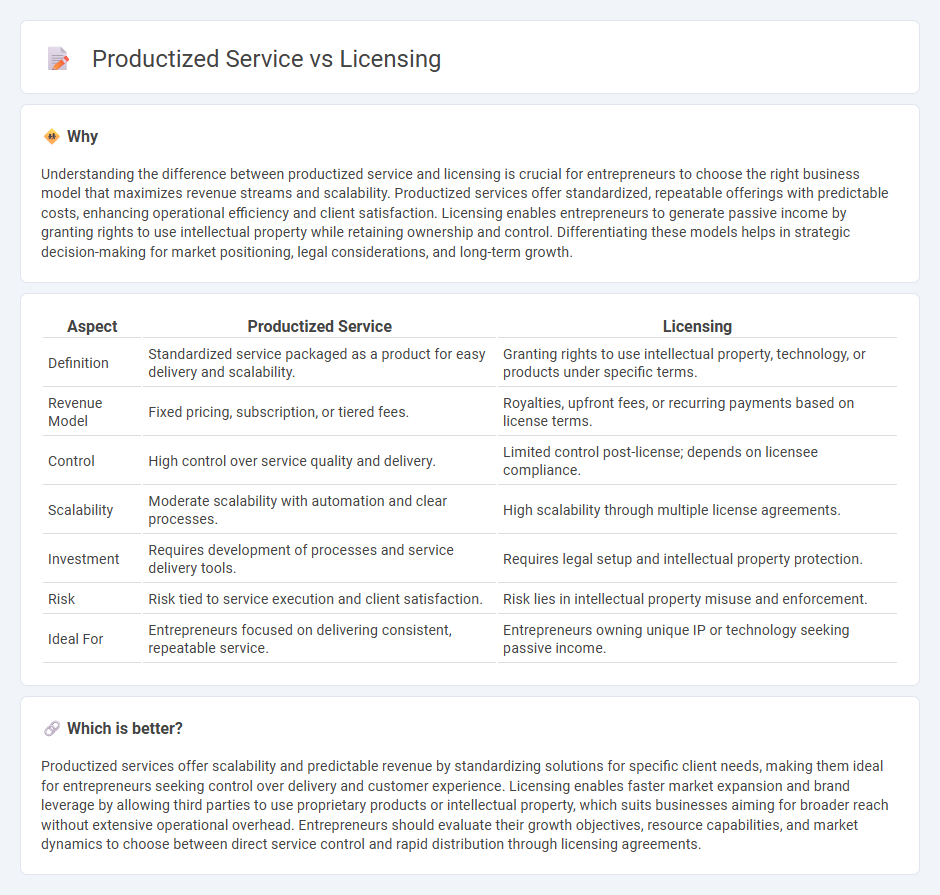
Productized services offer standardized solutions with fixed pricing, enabling entrepreneurs to scale efficiently by streamlining delivery and reducing customization costs. Licensing allows businesses to monetize intellectual property by granting third parties permission to use proprietary products or technologies, fostering market expansion without heavy operational overhead. Explore how choosing between productized services and licensing can strategically impact your entrepreneurial growth.
Why it is important
Understanding the difference between productized service and licensing is crucial for entrepreneurs to choose the right business model that maximizes revenue streams and scalability. Productized services offer standardized, repeatable offerings with predictable costs, enhancing operational efficiency and client satisfaction. Licensing enables entrepreneurs to generate passive income by granting rights to use intellectual property while retaining ownership and control. Differentiating these models helps in strategic decision-making for market positioning, legal considerations, and long-term growth.
Comparison Table
| Aspect | Productized Service | Licensing |
|---|---|---|
| Definition | Standardized service packaged as a product for easy delivery and scalability. | Granting rights to use intellectual property, technology, or products under specific terms. |
| Revenue Model | Fixed pricing, subscription, or tiered fees. | Royalties, upfront fees, or recurring payments based on license terms. |
| Control | High control over service quality and delivery. | Limited control post-license; depends on licensee compliance. |
| Scalability | Moderate scalability with automation and clear processes. | High scalability through multiple license agreements. |
| Investment | Requires development of processes and service delivery tools. | Requires legal setup and intellectual property protection. |
| Risk | Risk tied to service execution and client satisfaction. | Risk lies in intellectual property misuse and enforcement. |
| Ideal For | Entrepreneurs focused on delivering consistent, repeatable service. | Entrepreneurs owning unique IP or technology seeking passive income. |
Which is better?
Productized services offer scalability and predictable revenue by standardizing solutions for specific client needs, making them ideal for entrepreneurs seeking control over delivery and customer experience. Licensing enables faster market expansion and brand leverage by allowing third parties to use proprietary products or intellectual property, which suits businesses aiming for broader reach without extensive operational overhead. Entrepreneurs should evaluate their growth objectives, resource capabilities, and market dynamics to choose between direct service control and rapid distribution through licensing agreements.
Connection
Productized services streamline entrepreneurship by offering standardized, scalable solutions that simplify customer delivery and enhance efficiency. Licensing complements this model by allowing entrepreneurs to grant rights to use their productized service frameworks, expanding market reach without direct involvement. Together, these strategies accelerate business growth through scalable replication and intellectual property monetization.
Key Terms
Intellectual Property
Licensing grants third parties rights to use intellectual property under specific terms, enabling revenue without direct involvement in delivery or product development. Productized services package intellectual property into standardized offerings, streamlining delivery while maintaining control and consistency. Explore the nuances of intellectual property management in licensing versus productized services to optimize your business strategy.
Revenue Model
Licensing generates revenue through granting rights to use intellectual property, often resulting in recurring income via royalties or subscription fees, making it scalable with minimal ongoing service costs. Productized services package specific expertise into standardized offerings, driving revenue by delivering repeatable outcomes with fixed pricing, which enhances predictability and client acquisition. Explore detailed comparisons to optimize your business revenue model strategy.
Scalability
Licensing offers scalability by allowing software or intellectual property to be used repeatedly across multiple clients with minimal incremental effort, maximizing revenue potential without proportional increases in cost. Productized services scale efficiently through standardized packages and processes, enabling consistent delivery and easier replication by teams, which reduces customization time and operational complexity. Explore how choosing between licensing and productized services can transform your business scalability strategies.
Source and External Links
What is Licensing | Licensing International - Licensing is an agreement where a licensee leases rights to a legally protected intellectual property from a licensor, used broadly in industries like entertainment, sports, fashion, and corporate branding.
Licensing | Federal Communications Commission - The FCC manages and licenses the electromagnetic spectrum for commercial and non-commercial users, promoting efficient and reliable spectrum access for various services including public safety and broadcasting.
Licensing Overview - U.S. Copyright Office - The U.S. Copyright Office Licensing Section administers compulsory and statutory licenses under copyright law, requiring electronic filings and payments for royalty and licensing activities.
 dowidth.com
dowidth.com